Catalog excerpts
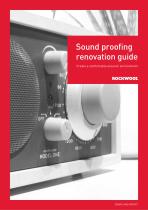
Sound proofing renovation guide Create a comfortable acoustic environment
Open the catalog to page 1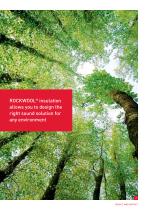
ROCKWOOL® insulation allows you to design the right sound solution for any environment
Open the catalog to page 3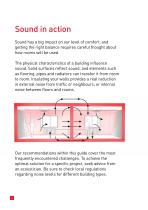
Sound in action Sound has a big impact on our level of comfort, and getting the right balance requires careful thought about how rooms will be used. The physical characteristics of a building influence sound. Solid surfaces reflect sound, and elements such as flooring, pipes and radiators can transfer it from room to room. Insulating your walls provides a real reduction in external noise from traffic or neighbours, or internal noise between floors and rooms. Our recommendations within this guide cover the most frequently encountered challenges. To achieve the optimal solution for a specific...
Open the catalog to page 4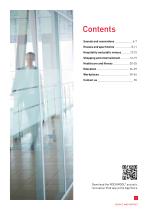
Contents Sounds and renovations Hospitality and public venues Download the ROCKWOOL® acoustic renovation iPad app at the App Store. 29 35 5
Open the catalog to page 5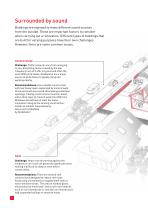
Surrounded by sound Buildings are exposed to many different sound sources from the outside. These are important factors to consider when carrying out a renovation. Different types of buildings that are built for varying purposes have their own challenges. However, there are some common issues. Traffic noise Challenge: Traffic noise can vary from annoying to very disturbing. Noise caused by the low frequency hum of traffic is typical and often the most difficult to tackle. Roadworks are a major source of disturbance to people living and working nearby. Recommendations: Use a double...
Open the catalog to page 6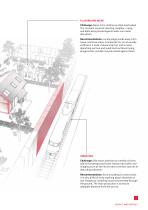
playground noise Challenge: Noise from children is often overlooked. The constant sound of shouting, laughter, crying and balls being tossed against walls can cause disruption. Recommendations: Locate playgrounds away from noise-sensitive areas. A noise barrier is not usually sufficient; if used, choose a barrier with a noise absorbing surface and avoid hard surfaces facing playgrounds, as balls may be tossed against them. Vibration Challenge: Vibrations and the low rumble of trains add to the background noise. Heavy road traffic and shipping such as ferries are also common sources of...
Open the catalog to page 7
Rest and relaxation At night, more than 30% of the population of the European Union are exposed to equivalent sound pressure levels exceeding 55 dB(A) which disturb sleep. World Health Organization Guidelines for Community Noise (1999) (dB(A) is an expression of the relative loudness of sounds in air as perceived by the human ear).
Open the catalog to page 8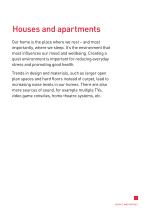
Houses and apartments Our home is the place where we rest – and most importantly, where we sleep. It’s the environment that most influences our mood and wellbeing. Creating a quiet environment is important for reducing everyday stress and promoting good health. Trends in design and materials, such as larger open plan spaces and hard floors instead of carpet, lead to increasing noise levels in our homes. There are also more sources of sound, for example multiple TVs, video game consoles, home theatre systems, etc.
Open the catalog to page 9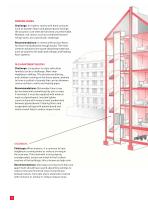
Modern homes Challenge: In modern rooms with hard surfaces such as wooden floors and plasterboard ceilings, the acoustics can often be hard and uncomfortable. Multiple-use rooms, such as combined kitchen/ living rooms, are a particular challenge. Recommendations: In rooms with hard surfaces, furniture rarely absorbs enough sound. The most common solutions are sound-absorbing materials, such as solutions for walls and ceilings, and floating floor systems. Old apartment blocks Challenge: Living door-to-door with other families can be a challenge. Next-door neighbours talking, TVs and stereos...
Open the catalog to page 10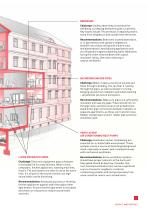
bedrooms Challenge: Undisturbed sleep is essential for wellbeing, so keeping bedrooms quiet is a priority. Key issues include TVs and music in adjoining rooms, noise from neighbours and sounds from the street. Recommendations: Bedrooms located downstairs, or in apartments with upstairs neighbours, benefit from a false ceiling with mineral wool and plasterboard. Avoid placing appliances such as refrigerators against adjoining walls. Bedrooms facing the street need windows with a good insulation rating. Use noise reducing or natural ventilation. Bathrooms/Water pipes Challenge: Water creates...
Open the catalog to page 11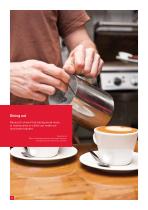
Dining out Research shows that background noise in restaurants or cafes can make our food taste blander. Woods et al. ”Effect of background noise on food perception”. Food Quality and Preference, Jan 2011.
Open the catalog to page 12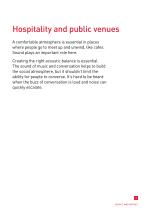
Hospitality and public venues A comfortable atmosphere is essential in places where people go to meet up and unwind, like cafes. Sound plays an important role here. Creating the right acoustic balance is essential. The sound of music and conversation helps to build the social atmosphere, but it shouldn’t limit the ability for people to converse. It’s hard to be heard when the buzz of conversation is loud and noise can quickly escalate.
Open the catalog to page 13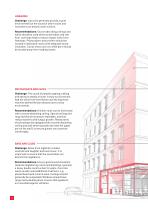
LIBRARIES Challenge: Libraries generally provide a quiet environment but the sound of other voices and movement can disturb some visitors. Recommendations: Sound-absorbing ceilings and walls should be used where practicable, and soft floor coverings help to reduce impact noise from footsteps. Photocopiers and printers should be located in dedicated rooms with adequate sound insulation. Social areas such as coffee bars should be located away from reading rooms. Restaurants and cafes Challenge: The sound of people laughing, talking and eating is always a factor in busy social venues. Add the...
Open the catalog to page 14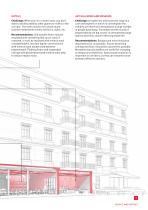
Challenge: When you’re in a hotel room, you don’t want to be disturbed by other guests or traffic in the corridor. The main concern is to avoid sound transferred between rooms via floors, walls, etc. Challenge: Art galleries and museums require a calm atmosphere in which to contemplate the exhibits, yet there will inevitably be a large number of people passing by. Footsteps and the sound of people talking are big issues, accentuated by large spaces and hard, sound-reflecting materials. Recommendations: Old wooden floors may be insulated with something like soil or sand. If removed, it must...
Open the catalog to page 15All ROCKWOOL catalogs and technical brochures
-
FirePro® SP FireStop OSCB
7 Pages
-
EWI System Holders
6 Pages
-
Cladding Roll
6 Pages
-
RainScreen Duo Slab®
11 Pages
-
NyRock® Cavity Slab 032
7 Pages
-
SOUND INSULATION SLAB
16 Pages
-
ductslab-ductwrap
12 Pages
-
HARDROCK® UB34
5 Pages
-
Hardrock Multi Fix DD
18 Pages
-
CAVITY
12 Pages
-
HP PARTIAL FILL CAVITY SLAB
12 Pages
-
TCB & PWCB CAVITY BARRIERS
12 Pages
-
THERMAL INSULATION CAVITY BATT
12 Pages
-
ACOUSTIC MEMBRANE
8 Pages
-
FIRE TUBE
3 Pages
-
ROCKFALL®
7 Pages
-
SOCIAL HOUSING
7 Pages
-
ENERGYSAVER
2 Pages
-
*NEW* ROCKWOOL TRADE RANGE
2 Pages
-
ROCKPRIME®
2 Pages
-
FIREPRO® SOFTSEAL
8 Pages
-
SAFER BUILDINGS
12 Pages
-
BRICKSHIELD®
6 Pages
-
Core Range UK
24 Pages






























